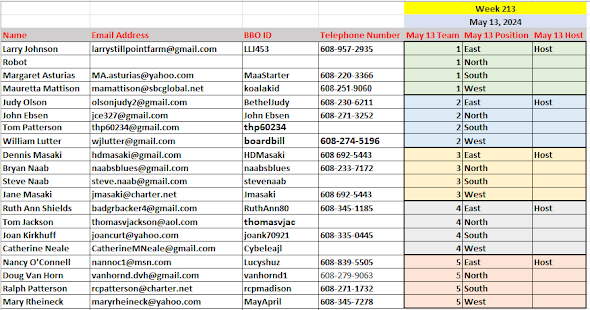Question
1: What steps should a person in the Monday Morning Bridge group take to
improve their bridge game?
Question
2 follows Question 1.
Question
2: How do you know when you are improving? I took this quote from a
youth bridge website:
‘ Outcomes are your scores. Unfortunately,
scores have a randomness factor. You can play a hand well and get a bad score.
You can also play a hand poorly and get a good one. You can even play flawlessly
for a whole session and get a mediocre score, or play mixed and get a great
one.’
Based on this randomness how does one know they
are improving?
Vic:
QUESTION
ONE - Steps to Improve?
Answer:
Play the Game
No
teacher/book/computer program/ whatever can “learn" you how to play
bridge. Resources like those can only “teach” you how to play bridge. The
learning is up to you. And the only way to “learn” the game is to play the
game. It is that simple.
Analogy:
No teacher/book/computer program/ whatever can “learn" you how to ride a
bike. They can teach you where to put your hands, where to put your feet, how
to propel yourself forward, how to stop. They can give you helpful hints (the
slower you propel yourself forward, the more difficult it is to balance). They
can even demonstrate how it is done. But ultimately, it is up to you to summon
up the courage to fail, then take a deep breath & get on your bike &
shove off. And if you crash & burn, you need to bandage up or give the
broken bones time to heal, then summon up your courage, take a deep breath,
& shove off again.
You
want to improve your bridge? Then you need to dare to fail, summon up your
courage, take a deep breath, & play bridge whenever you can. The more you
play, the faster you will learn. The less you play the slower you will learn.
And no teacher/book/computer program/ whatever is going to change that
dynamic.
At
least half of the time you play you should endeavor to play with/against
players who are better than you are. We call that “playing up”. A steady diet
of playing only within a group of people at your own experience level will not
pay dividends very quickly. Basically, you simply reinforce the faults you are
all making & extend the status quo with little expectation of improving
very much at all.
I do
NOT recommend online games against the robots, especially for inexperienced
players. The robots are programmed to play a system which I believe is called
GIB. You can read in detail about that system on the ACBL website, but I do not
recommend you do so. It is bizarrely different in numerous ways from the
Standard American or Two Over One bidding system you have been taught. To make
matters worse the robots frequently do NOT have the hand that clicking on their
bids tells you they have - sometimes not even close. They lie big time which
can be frustrating to the extreme.
I
highly recommend a program available on line called “Bridge Clues”. You will
find six hands that you can play for free that change daily (circa 6 pm). The
hands will put you on the spot to make decisions about bidding or play of the
hand, then lead you thru a critique of the decisions you make. Do the Beginner
& Level One hands for sure. It is a great way to learn. Google: “Bridge
Clues” Choose: “Get Started"
QUESTION
TWO - How to Measure?
Answer:
Long Term Trends
How
frequently are you making your contracts? How frequently do you find yourself
wishing you had reached a different contract? How frequently are you setting
your opponents contracts? How frequently do you make games you did not bid? How
frequently do you bid games that can’t possibly be made? Is the frequency of
any of the above better this month than it was last month?
In
addition to the questions posed above there are many others. But you need to
figure out a way to track them over time. One good session or one bad session
can simply be luck of the draw.







